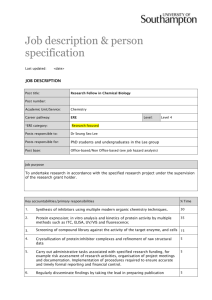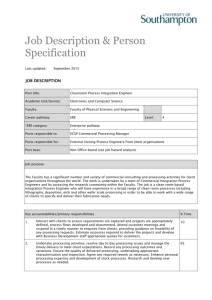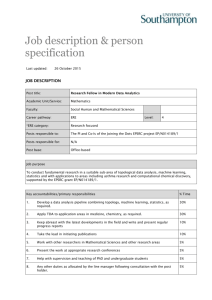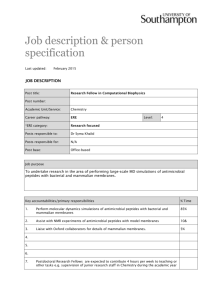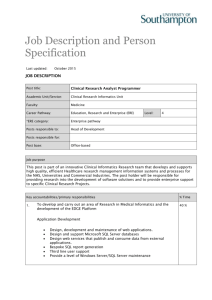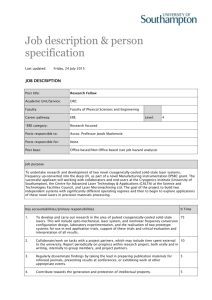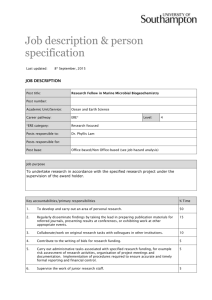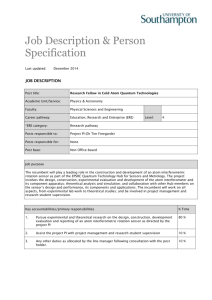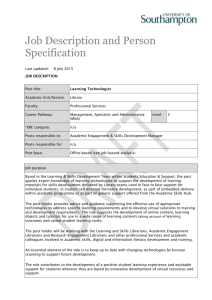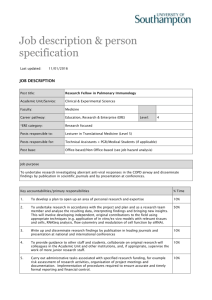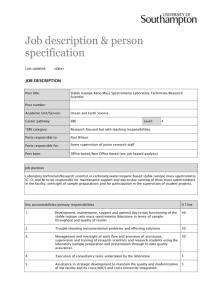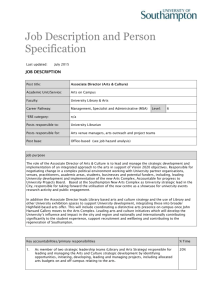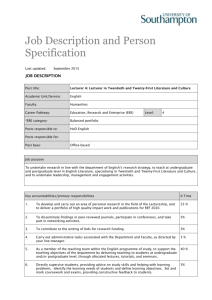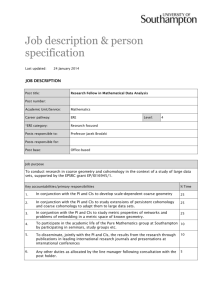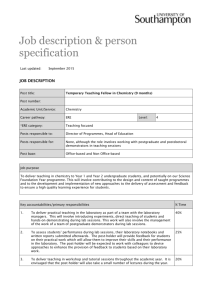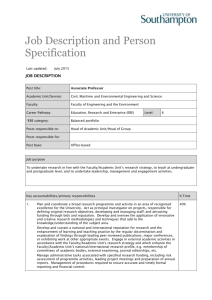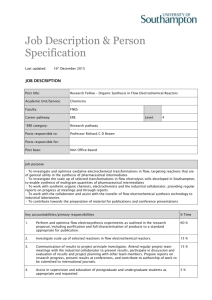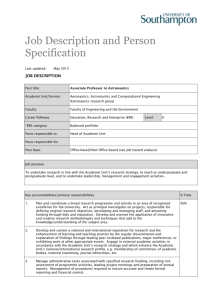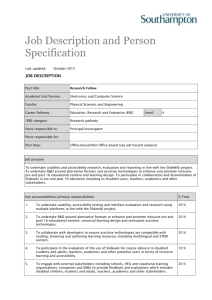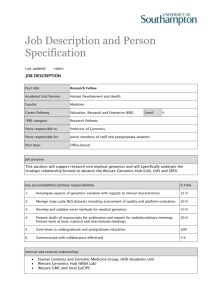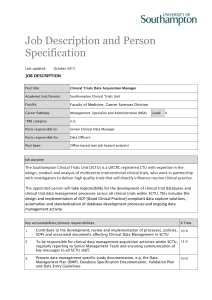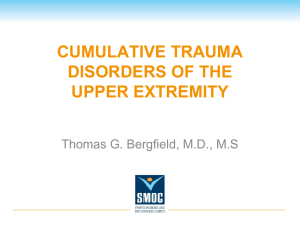Job Description and Person Specification
advertisement
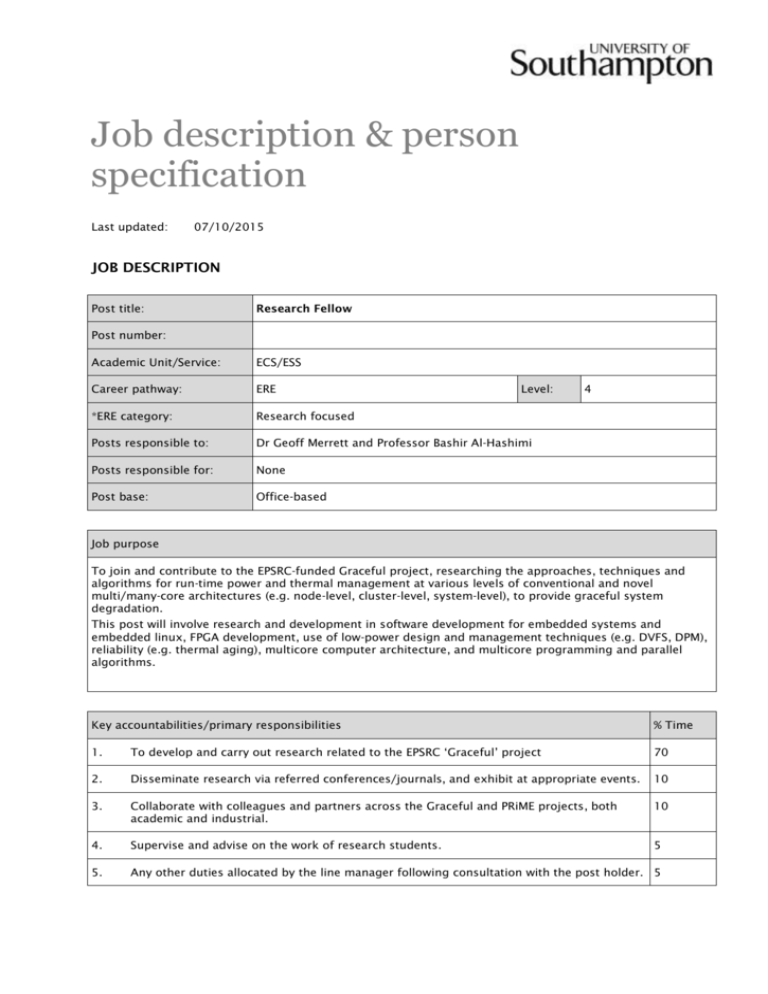
Job description & person specification Last updated: 07/10/2015 JOB DESCRIPTION Post title: Research Fellow Post number: Academic Unit/Service: ECS/ESS Career pathway: ERE *ERE category: Research focused Posts responsible to: Dr Geoff Merrett and Professor Bashir Al-Hashimi Posts responsible for: None Post base: Office-based Level: 4 Job purpose To join and contribute to the EPSRC-funded Graceful project, researching the approaches, techniques and algorithms for run-time power and thermal management at various levels of conventional and novel multi/many-core architectures (e.g. node-level, cluster-level, system-level), to provide graceful system degradation. This post will involve research and development in software development for embedded systems and embedded linux, FPGA development, use of low-power design and management techniques (e.g. DVFS, DPM), reliability (e.g. thermal aging), multicore computer architecture, and multicore programming and parallel algorithms. Key accountabilities/primary responsibilities % Time 1. To develop and carry out research related to the EPSRC ‘Graceful’ project 70 2. Disseminate research via referred conferences/journals, and exhibit at appropriate events. 10 3. Collaborate with colleagues and partners across the Graceful and PRiME projects, both academic and industrial. 10 4. Supervise and advise on the work of research students. 5 5. Any other duties allocated by the line manager following consultation with the post holder. 5 Internal and external relationships (including nature and purpose of relationships) It is expected that the postholder will be confident interacting with other researchers at Southampton, the partner institutions (York and Manchester) teams, and the major PRiME project (www.prime-project.org) being led by the investigators at Southampton. Travel to research team meetings and conferences/workshops will be expected. Direct responsibility to holder of research award/academic supervisor. May have additional reporting and liaison responsibilities to external funding bodies or sponsors, collaborators/colleagues in other work areas and institutions. PERSON SPECIFICATION How to be assessed Criteria Essential Qualifications, knowledge & experience PhD or equivalent professional qualifications and experience in the A/I following areas: software development for embedded systems and embedded linux; FPGA development; low-power design and management techniques (e.g. DVFS, DPM); reliability (e.g. thermal aging); multicore computer architecture; multicore programming and parallel algorithms. Planning & organising Able to organise own output in relation to programme research aspirations. A/I Able to prioritise work effectively to work within fixed and often tight timeframes to deliver vital research/demonstrator output. Problem solving & initiative Able to develop an understanding of complex problems and apply indepth knowledge to address them A/I Have a track record of publications Management & teamwork Work effectively in a team, understanding the strengths and weaknesses of others to help teamwork development A/I Experience of contributing/leading upon multiple author publications Communicating & influencing Communicate new and complex information effectively, both verbally and in writing, engaging the interest and enthusiasm of the target audience A/I Have a track record of presenting work undertaken Other skills & behaviours Understanding of relevant Health & Safety issues Special requirements Travel to external research team meetings will be expected as will to conferences in UK and overseas. Document1 A/I High level of computing ability 2 JOB HAZARD ANALYSIS OFFICE-BASED POST If this post is an office-based job with routine office hazards (eg: use of VDU) no further information needs to be supplied. NON-OFFICE BASED POST If this post has some hazards other than routine office (eg: more than use of VDU) please complete the analysis below. ## - HR will send a full PEHQ to all applicants for this position. ENVIRONMENTAL EXPOSURES Occasionally Frequently Constantly (<30% of time) (30-60% of time) (> 60% of time) Outside work Extremes of temperature (eg: fridge/ furnace) ## Potential for exposure to body fluids ## Noise (greater than 80 dba - 8 hrs twa) ## Exposure to hazardous substances (eg: solvents, liquids, dust, fumes, biohazards). Specify below: Frequent hand washing Ionising radiation EQUIPMENT/TOOLS/MACHINES USED ## Food handling ## Driving university vehicles(eg: car/van/LGV/PCV) ## Use of latex gloves (prohibited unless specific clinical necessity) ## Vibrating tools (eg: strimmers, hammer drill, lawnmowers) PHYSICAL ABILITIES Load manual handling Repetitive crouching/kneeling/stooping Repetitive pulling/pushing Repetitive lifting Standing for prolonged periods Repetitive climbing (ie: steps, stools, ladders, stairs) Fine motor grips (eg: pipetting) Gross motor grips Repetitive reaching below shoulder height Repetitive reaching at shoulder height Repetitive reaching above shoulder height PSYCHOSOCIAL ISSUES Face to face contact with public Lone working ## Shift work/night work/on call duties Document1 3
